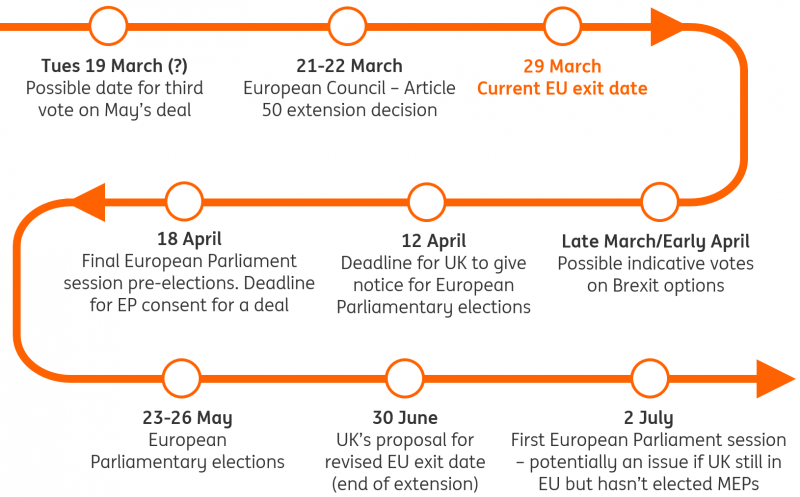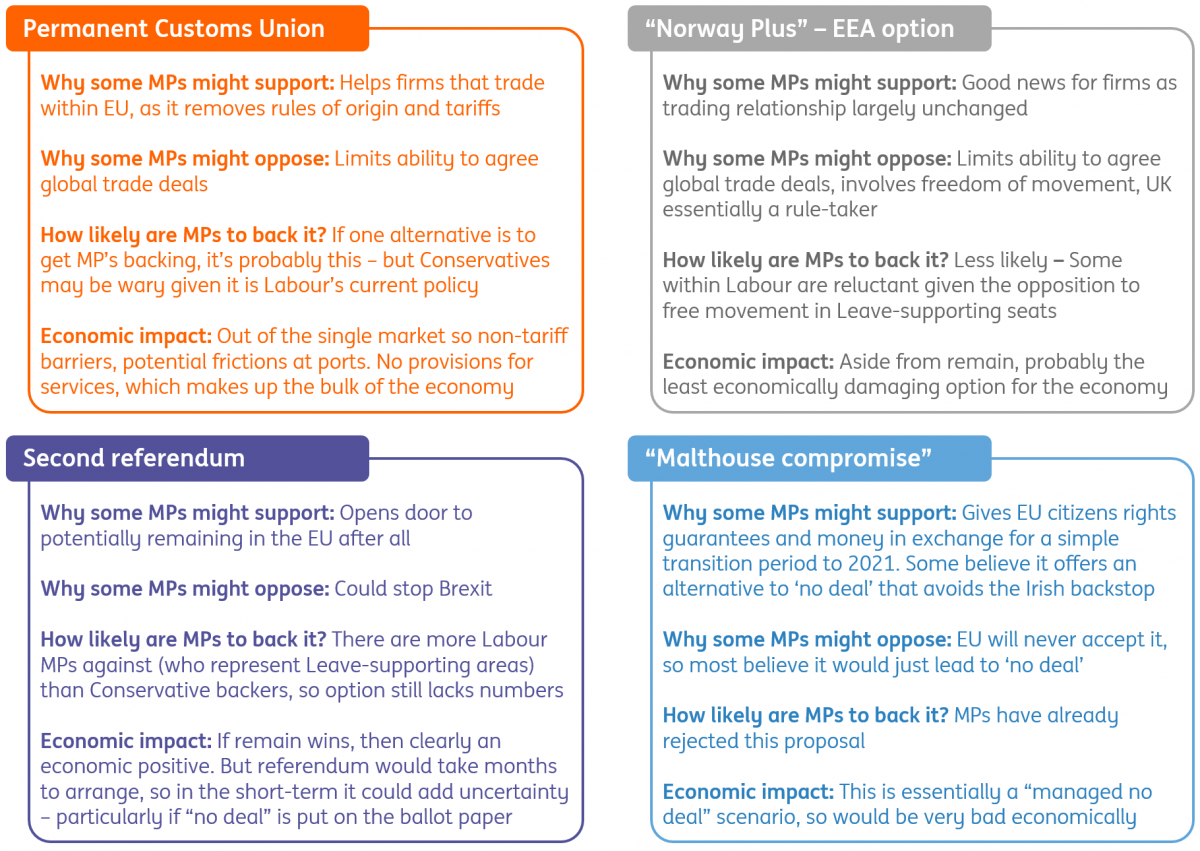With the wind blowing towards a shorter delay to the Brexit process and Parliament seemingly reluctant to back an alternative option, we suspect Prime Minister May will continue to struggle to convince the Brexiteers to back her deal over the coming week.
By James Smith, Developed Markets Economist
May's challenge to the Brexiteers
It has been another rollercoaster week in Westminster, but the key development is that lawmakers have voted to ask the EU for a delay to the 29 March Brexit deadline.
Brussels will decide how long this should last at the European Council meeting on 21/22 March. But in the meantime, the stage is set for another crucial vote on the Prime Minister's Brexit deal - most likely next week. After the events of the past few days, the message from Theresa May to her Brexiteers is clear.
Back the current deal and the UK will leave the EU by the end of June, or reject it, and the door opens to a much longer delay, indicative votes on different Brexit options (which could see a softer outcome or no EU exit at all) and European Parliamentary elections.
The question is: will this thinly-veiled threat help get May's deal over the line on the third attempt? The answer, we suspect, is 'no' - and the reason for this has a lot to do with the choreography of the next few days and weeks.
Tuesday - Possible third meaningful vote on May's deal
Rather like the third iteration of a disappointing film trilogy, many may well be questioning why the Prime Minister is attempting what is being dubbed 'Meaningful Vote 3'. After all, May's deal was defeated by 149 votes on Wednesday evening, one of the largest government defeats on record. What's more, the EU has made it pretty clear that the UK has extracted all the reassurances it is going to get on the contentious Irish backstop.
There is a lot of focus on the UK Attorney General Geoffrey Cox, who is reportedly in talks with the Democratic Unionist Party (DUP) to see how he can change his legal advice on the Irish backstop. Remember the theory goes that if the government can win over the DUP, then many Conservative MPs, as well as some Labour lawmakers, may follow in backing the deal.
To recap, the DUP and others want there to be a legal mechanism for the UK to extract itself from the backstop at a future date, but so far the Attorney General has been unable to give this assurance. In most recent talks within the government, there is reportedly focus on the Vienna Convention as a kind of 'nuclear option' to get out of the backstop - although a series of legal experts have poured cold water over this idea.
On the basis that the Attorney General doesn't manage pull a rabbit out of the hat, in the end it will come down to politics. Whether or not May's deal succeeds will depend on a) whether the Brexiteers think there is a real chance of a long Brexit delay and b) whether they think Parliament is likely to rally around a softer Brexit alternative.
Let's look at both of those in turn.
Thursday/Friday – European Council verdict on Brexit delay
While most people believe European leaders would be prepared to back an extension of some form, there is no clear consensus on how long they think it should last.
The default option looks most like a short, two-three month delay. That avoids many of the logistical headaches surrounding the European Parliamentary elections, which the UK is not scheduled to take part in. However, the problem comes if both sides get to the end of a short extension, haven't been able to break the deadlock, and want to delay Brexit further.
Come the end of June, which is when the UK is proposing it leaves the EU, the UK may not have held European elections (note Britain needs to give notice by 12 April if it is to hold them). This means it would not have representatives in place by 2 July when the new EU Parliament sits for the first time.
Legal opinion is divided on how big an issue this is. Some have previously suggested that without UK representation, some European Parliament decisions may lose validity, although equally a number of other legal experts - including an Advocate-General of the ECJ - have indicated the problems are not insurmountable.
Either way, it is undoubtedly a headache and some EU officials - most notably European Council President Donald Tusk - have opened the door to a longer extension. That would require the UK to commit to holding European elections upfront, but leaders have also made it crystal clear that to unlock a longer delay, Britain would need a valid excuse. That could include a second referendum, backing a softer Brexit stance or general elections.
Importantly though, unless May's deal passes next week, the UK probably won't have the 'valid reason' it needs in time for the European Council. On Thursday night, lawmakers narrowly rejected a proposal put forward by Labour MP Hilary Benn, that would have forced the government to hold 'indicative votes' on the different Brexit options next Wednesday (i.e. the day before the European Council meeting).
As a compromise, the government has said it will allow Parliament to have its say on different Brexit options in the few weeks following the Council meeting next week.
While we're unlikely to know for sure what the EU's thinking is on an extension until next week, it seems that at this stage, all of this means a shorter extension looks more likely than a longer one. This implies that when it comes to backing May's deal, the Brexiteers & DUP may be less inclined to budge.
Late March/Early April - Indicative votes
The second part of Theresa May's threat to the Brexiteers is premised on the idea that Parliament will back a softer Brexit stance when lawmakers get the opportunity to have their say through indicative votes in a week or so.
We've noted some of the key alternative Brexit options in the graphic below - but the key point is that no particular option is guaranteed to pass.
- A second referendum still lacks majority support, and that was made eminently clear on Thursday night. While many supporters of this option chose - or were forced by party whips - to abstain in a vote on a second referendum on Thursday, the fact that only 85 MPs voted in favour is nevertheless revealing.
- A softer Brexit stance - either a permanent customs union or some form of EEA membership - stands a better chance of succeeding in the end. However, on the basis that these indicative votes are likely to take place after an Article 50 extension is confirmed, the immediate heat will have been taken out of the situation. This means that some MPs may be less inclined to show their true colours than they might otherwise have been if things had gone down to the wire. For more moderate Conservative MPs, the permanent customs union idea will sound a bit too much like Labour Party policy, meaning they may be reluctant to get behind it - even if, in the end, they may be prepared back this kind of option.
Putting all of this together, the Brexiteers may calculate that a) a shorter Brexit delay is more likely than a long one and b) Parliament may not decide to push for a different Brexit stance after all (or at least, not yet).
Bottom line - May's deal still looks destined to fail if it returns to Parliament next week.
Content Disclaimer
This publication has been prepared by ING solely for information purposes irrespective of a particular user's means, financial situation or investment objectives. The information does not constitute investment recommendation, and nor is it investment, legal or tax advice or an offer or solicitation to purchase or sell any financial instrument. Read more


